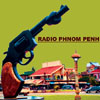 This is ironic inthat the number of Cambodian recordings in American distribution isstill extremely small, and those that exist, at least those thatpre-date the Khmer Rouge takeover, lack what most would consider thebare minimum in historical notation. Part of the appeal of releaseslike the Cambodian Rocks compilations, or Sublime Frequencies' own Cambodian Cassette Archives,comes from the covertness of their sources: dilapidated,poorly-recorded, unpreserved cassette tapes, hocked (as the story goes)by anonymous cabbies in Phnom Penh, or approaching obscurity inforgotten drawers of the Oakland Public Library. As fun as it may be toimagine a country whose pop culture exists as a kind of romantic ruin,an attic assemblage of label-less artifacts, the story of Cambodian popcomes colored with the darker presence of the Khmer Rouge, whose riseto power in the late 70's resulted in the death of many of thecountry's most talented and popular musicians. Today, in an ironiceffort to preserve the youth's interest in Cambodia's musicaltraditions, the older, classic songs are essentially "re-mixed" forbroadcast, fitted with the punchy rhythm tracks and the syntheticmelodies of a new age. In this radio collage from capital Phnom Penh,Bishop does little to untangle the cultural mish-mash of this people'ssound. Instead, he is content to let old and new songs (broadcast on AMan FM respectively) commingle among the country's already diversepalette of pop and rock influences to create an image of Cambodia todayjust as veiled and illusory as any promoted by Cambodian Rocks.It is impossible to deny that in the 60's and 70's Cambodia producedsome truly vital, though largely unheard pop and rock music. Theirscontains all of the manic, hyper-colorful qualities of Burmese andother Southeast Asian popular styles but receives a more generous doseof the Western rock sound, no doubt the result of the country's statusas a French colony during the 18's, and neighbor to the Americanpresence in Vietnam soon after. There could surely be a new Nuggetsbox compiling Cambodian assimilations of the garage rock sound, theirbright vocal, bell, and horn melodies turning the most generic fuzzygrooves to ecstatic, timeless reveries. Straight Beatles covers meetalongside raga jams from the Indian coast in a fusion that might'vemade George Harrison cringe at his own feeble attempts. There areclipped, funky breaks Dr. Dre could've sampled, slinky opium-denballads, nostalgic wedding songs, and raucous love songs wherecall-and-response vocals dip and soar to vicious, theatric extremes.Unlike past Radio releases on his label, here Bishop leaves thesongs themselves as the primary focus, limiting the commercialsnippits, DJ-speak, and noisy dial-spinning that created such exciting,"real-time" atmospheres on previous discs. As a result, Radio Phnom Penhfeels more like a subconscious document of Cambodia's musical history,where the myriad of influences, old and new, foreign and domestic,creates a crowded snapshot of today, offering little more in terms ofhistorical notation than its predecessors, but remaining anirresistible and invaluable witness.
This is ironic inthat the number of Cambodian recordings in American distribution isstill extremely small, and those that exist, at least those thatpre-date the Khmer Rouge takeover, lack what most would consider thebare minimum in historical notation. Part of the appeal of releaseslike the Cambodian Rocks compilations, or Sublime Frequencies' own Cambodian Cassette Archives,comes from the covertness of their sources: dilapidated,poorly-recorded, unpreserved cassette tapes, hocked (as the story goes)by anonymous cabbies in Phnom Penh, or approaching obscurity inforgotten drawers of the Oakland Public Library. As fun as it may be toimagine a country whose pop culture exists as a kind of romantic ruin,an attic assemblage of label-less artifacts, the story of Cambodian popcomes colored with the darker presence of the Khmer Rouge, whose riseto power in the late 70's resulted in the death of many of thecountry's most talented and popular musicians. Today, in an ironiceffort to preserve the youth's interest in Cambodia's musicaltraditions, the older, classic songs are essentially "re-mixed" forbroadcast, fitted with the punchy rhythm tracks and the syntheticmelodies of a new age. In this radio collage from capital Phnom Penh,Bishop does little to untangle the cultural mish-mash of this people'ssound. Instead, he is content to let old and new songs (broadcast on AMan FM respectively) commingle among the country's already diversepalette of pop and rock influences to create an image of Cambodia todayjust as veiled and illusory as any promoted by Cambodian Rocks.It is impossible to deny that in the 60's and 70's Cambodia producedsome truly vital, though largely unheard pop and rock music. Theirscontains all of the manic, hyper-colorful qualities of Burmese andother Southeast Asian popular styles but receives a more generous doseof the Western rock sound, no doubt the result of the country's statusas a French colony during the 18's, and neighbor to the Americanpresence in Vietnam soon after. There could surely be a new Nuggetsbox compiling Cambodian assimilations of the garage rock sound, theirbright vocal, bell, and horn melodies turning the most generic fuzzygrooves to ecstatic, timeless reveries. Straight Beatles covers meetalongside raga jams from the Indian coast in a fusion that might'vemade George Harrison cringe at his own feeble attempts. There areclipped, funky breaks Dr. Dre could've sampled, slinky opium-denballads, nostalgic wedding songs, and raucous love songs wherecall-and-response vocals dip and soar to vicious, theatric extremes.Unlike past Radio releases on his label, here Bishop leaves thesongs themselves as the primary focus, limiting the commercialsnippits, DJ-speak, and noisy dial-spinning that created such exciting,"real-time" atmospheres on previous discs. As a result, Radio Phnom Penhfeels more like a subconscious document of Cambodia's musical history,where the myriad of influences, old and new, foreign and domestic,creates a crowded snapshot of today, offering little more in terms ofhistorical notation than its predecessors, but remaining anirresistible and invaluable witness. samples:
Read More

